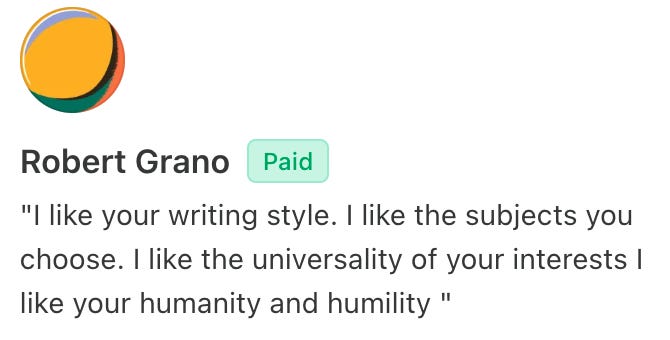Voluntary Servitude
And how you can free yourself, if you are willing...
“Liberty is the only joy upon which men do not seem to insist; for surely if they really wanted it, they would receive it.”
~ Étienne de La Boétie, Discourse on Voluntary Servitude (1548)
Joel Bowman with today’s Note From the End of the World: Buenos Aires, Argentina...
What is the nature of existence?
Why does a just God allow suffering?
Are politicians evil... stupid... or both?
Many and varied are the questions keeping philosophers, theologians and idle newsletter scribblers awake at night.
(Did you hear the one about how the agnostic, dyslexic, insomniac passes his time? Lying awake at night wondering whether there is really a dog...)
Today, we examine another such question, one taken up by the 16th century French magistrate and humanist, Étienne de La Boétie. In his Discourse on Voluntary Servitude, the close friend of Montaigne wondered:
Why do people submit to tyranny, when the people are many, and the tyrant is but one? Why not simply withdraw their consent?
After all, wrote Boétie...
“It is the people themselves who permit, or rather bring about, their own subjection, since by ceasing to submit they would put an end to their servitude.”
Renaissance Man
An textbook Renaissance classicist, and very much a student of Cicero, Tacitus, and Plutarch, Boétie was interested in the perennial questions regarding individual liberty versus collective servitude (“Or would you have me call it ‘the slavery of our own consent?’”), in particular as it pertained to the hereditary “right” to power, such as then claimed by King Henry II.
Indeed, the France of young Boétie, a law student of just 18 tender years when he penned his Discourses, was one very much shaken by the political unrest of the day. Amidst a flourishing in the arts, literature and philosophy, a sweeping tax rebellion, the Revolt of the Pitauds (1548), had just spread through the country’s Southwest, whence Boétie hailed, and he likely witnessed both the discontent among the citizenry... and the brutal response from the king, who was at the time working to consolidate power into an absolute monarchy.
Not for another century did France succumb to the doctrine of divine-right absolutism, when Louis XIV famously declared “L’État, c’est moi” (“I am the state”). It was a political ideology that would define the kingdom and its subjects right through to the French Revolution, in 1789, when Louis XVI was given the guillotine’s closest shave... and a new mob of Jacobins, jackanapes and jackasses assumed the throne.
Looking around the world today, we count 195 sovereign states (give or take). Each state, in turn, features its own political architecture, peculiar to its own people, and applicable within its own crime scene outline borders. The political structures themselves differ in ways both meaningful and cosmetic, but atop each and every heap, as is observed in nature herself, resides the apex predator.
Whether the people call him King or President, Prime Minister or Emir, Sultan or Dear Leader, hardly matters. For some period of time, usually as long as he can get away with it, he is their supreme ruler, their tyrant (from the Greek týrannos, meaning simply “king” or “leader,” neither good nor bad – it was the Romans, naturally, who added the negative connotation, probably during the 2nd–1st centuries BC, amidst the political turbulence of the late Republic).
Beneath our first primate, our primus primas, lives an overfed caste of dopey dauphins, junior Eichmen, compulsive meddlers, sidewalk superintendents, nosey parkers and giant gobermouches, more generally known as bureaucrats (collective noun: congress).
All claim some degree of political power, unnaturally superior to the unwashed masses they so modestly affect to serve.
Power Corrupts
In the United States of America alone, there are 535 such specimens haunting the halls of congress; 435 in the House of Representatives and 100 more in the Senate. Stir in another 7,386 or so state legislators – meddlers, swindlers and knaves to the last – and call it, neatly, 8,000 head of prattle. Now multiply this by ~200 states around the world – some with more people... others less – and we get ~1.6 million “leaders,” roughly equal to the population of Philadelphia.
Would it really be so terrible to invite the aforementioned indignitaries to a lavish banquet on, say, the Pitcairn Islands... to praise them for their selfless sacrifices, their heroic contributions to humanity, their ingrate causes and breathless speeches...
... then sink the whole thing beneath the waves?
Would the world, and those of us left residing on it, be any worse for such a simple, and cost-effective, remedy?
We are many, after all, and they are few. Why feed the mouth that bites? Why “consent to our servitude”? Why not simply do away with their murine ilk and be done with it, once and for all?
For starters, as the French soon discovered after their own revolution, there is no sapiens so monarchical as a republican who has just tossed a king from his throne. Cut off the head and, like the mythological Hydra, two gaping maws writhe and gnash in its place. Hardly a strategy that rewards repetition, as Boétie recognized from his own experience during the Pitaud tax revolt.
Rather than attack... rebel... rage against the machine... Boétie counseled a more subtle, indirect approach to the “problem of power,” one that sought to neutralize the abuse at its very source…
Whether the Featherless Biped-in-Chief claims his power by pure might, divine right, or that squishiest of notions, the “will of the people,” the fact is that he maintains it through one thing and one thing only, what Locke called: the consent of the governed.
For well the king knows, without the “slavery of our own consent,” his guards would not shield him, his armies would not obey him, and the “swarms of officers sent hither to harass our people and eat out their substance” would be impelled to lay down their arms, confront their deserved shame, and learn at last to till their own fields.
Evolution > Revolution
Still, the question begs itself: why consent in the first instance? Give a man an inch and he’ll take a mile. Give a politician a mile, and he’ll claim the ground beneath your feet. As Boétie himself writes:
“The more tyrants pillage, the more they demand; the more they ruin and destroy, the more they ask, the more they are obeyed. And the more they are obeyed, the stronger they become and the more able to destroy everything.”
And is history not replete with examples of just this vicious cycle? Take a look around. We’ll wait…
It was another Frenchman, that incorrigible scamp Jean-Jaques Rousseau, writing some two centuries after Boétie, who tried to circle that square by proposing the Social Contract... a wholly imagined pact in which “Each of us puts his person ... under the supreme direction of the general will.”
Ah, but what is this “general will?” the miffed individual rightly asks, searching in vain for his own signature on the phantom document. And from which earnest, enlightened eminence emanates the “supreme direction?”
“We’ll let you know,” replies Rousseau, “when you need to know.”
Not so! declares Boétie. When it comes to politicis intermissis, it’s never too late for early withdrawal. From Discourses:
“Resolve to serve no more, and you are at once freed. I do not ask you to place hands upon the tyrant to topple him over, but simply no longer support him, and you will see him, like a great colossus whose pedestal has been taken away, fall of his own weight and break in pieces.”
No violence. No blood in the streets. No negotiations. No stooping to their level or speaking their language. No more “revolutions,” returning us – by definition – to our point of origin. Just civil disobedience, of the kind later advocated by Tolstoy, Thoreau, Gandhi, MLK, et alia. Peaceful disengagement. Political evolution.
Our ancestors languished under the capricious reign of kings and queens, the lash of tyrants, the yoke of mere mammals who rose to – and maintained – power on the consent of we, the enslaved. That we have endured the heavy hand of the State in times of yore is no argument for continuing to shoulder its dead weight into the future.
“The tyrant,” wrote Boétie, “has nothing more than the power you give him; he can do you no harm unless you prefer to suffer, and you can free yourself if you are willing.”
Stay tuned for more Notes From the End of the World...
Cheers,
Joel Bowman
P.S. “But Joel,” we hear you ask, “how do we build a new world, one founded on the principals of voluntary exchange, cooperation over coercion, freedom over force?”
Great question! The long answer is, we don’t know. The short answer… let’s start with one idea, one page, one voluntary, mutually beneficial association at a time... and see where it goes.
And look! Here are more generous readers who freely choose to support independent writing and critical thinking over mainstream, mono-messaging “news.”
Thanks to ALL our dear Notes members for your kind and considered support. If you’re not already a member, but you’re enjoying our scribbles and would like to show your appreciation, kindly consider joining our community today…






So why do we submit? Simply put, because any individual who refuses, or withdraws his consent, will fairly quickly find enforcers from said government on his doorstep, ready to mete out severe consequences for not submitting. In most cases, more severe than the actual offense (as they define it) merits, so as to make that individual an example to all who might be considering a similar action that the consequences of doing so are dire.
Supreme Court Justice Holmes, a century ago, said, "Taxes are the price we pay for a civilized society," to which an impertinent wag later responded, "No, taxes are the price we pay to stay out of jail."
And those who try to lead others to arouse mass movements that refuse to submit very quickly find themselves facing the full - and heavily armed - force of the government who demands their submission. Remember, the definition of a government, whatever its type, is that organization which has a monopoly on the legal use of force within its borders. That is, the law grants them the authority to beat you up and throw you in jail, but if you resist, the legal consequences are even greater. Thus the old saying: If you come at the king, you had best not miss.
Your thoughts really hit home. Lately my thoughts turn to " what if all young men refused to serve when Caesar takes us to ww3?" Vietnam resulted in men going to Canada to escape the draft. I condemned them at the time but now I see how totally ignorant I was. Thinkers of the past and today have made me understand truth and to always seek the same. You are a part of that troop of understanding and I thank you. God's blessings to you and your family and to all who seek truth.